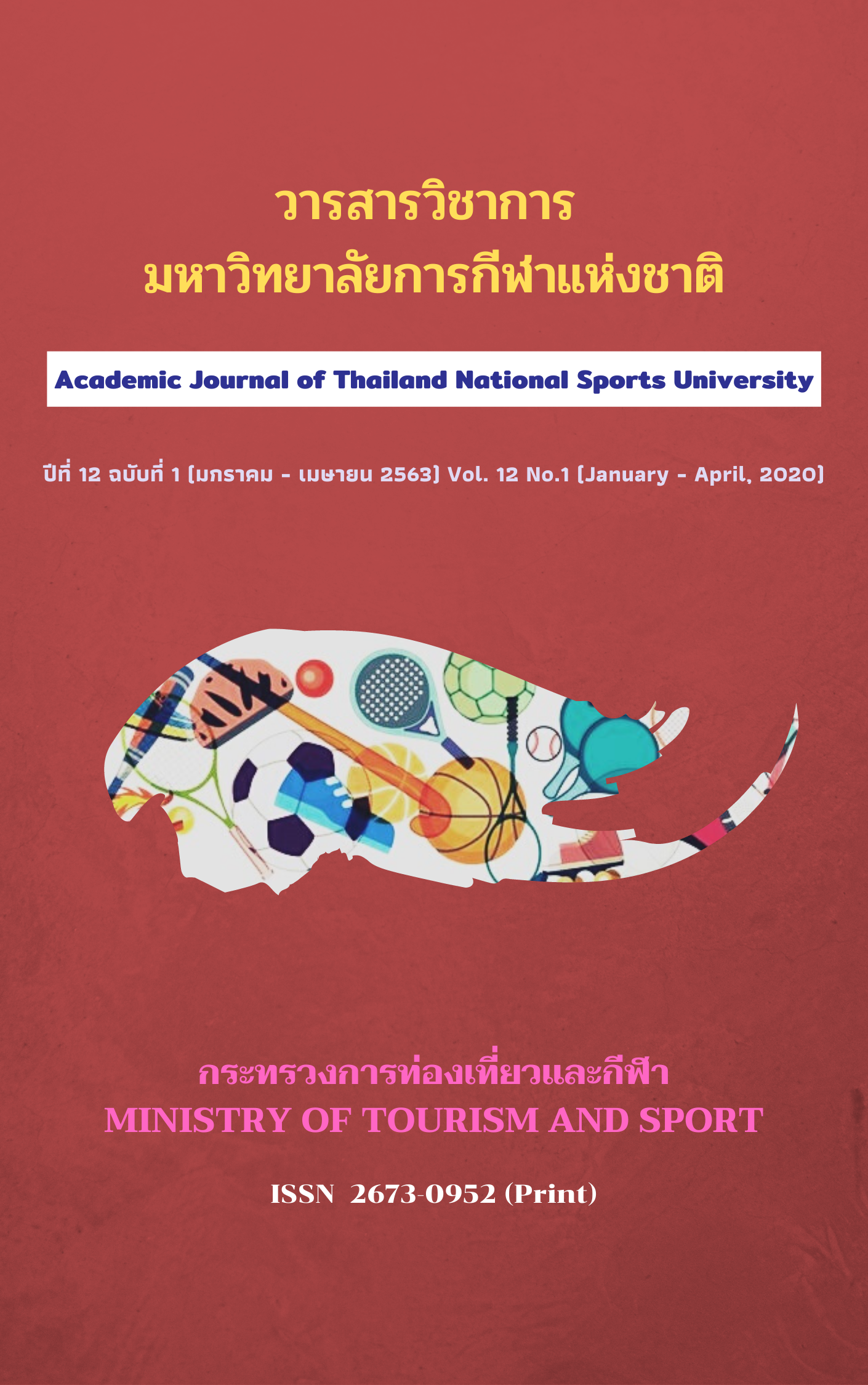CONCEPTION OF PROFESSIONAL ATHLETES PARTICIPATING IN THE THREE SOUTHERN BORDER PROVINCIAL FOOTBALL CLUB TRAINING AFFAIRS
Main Article Content
Abstract
The purpose of this study was to determine the conceptions of professional athletes participating in the three southern border provincial football club training affairs. The five areas such as physical and mental, economic and social, education, moral and ethics, and Islamic religion were assessed. Conception level of the athletes was determined and tested for significant difference. The descriptive survey method of research with the 5-point scales questionnaire as the main data gathering instrument was used. Ninety-four respondents were used as samples from a total population of 103. Statistical treatment used were frequency distribution, percentage, mean, standard deviation, and One Way Analysis of Variance. Significant difference level was set at 0.05.
Based on the analysis of the gathered data, the following are the findings: 1) The overall conception level consisted of five areas such as physical and mental, economic and social, education, moral and ethics, and Islamic religion of the three southern border provincial football club athletes was rated at a high level; 2) no significant difference was found among the conception level of the three southern border provincial football club athletes; 3) no significant difference was found among the conception level of the three southern border provincial football club athletes in Islamic religion area.
Article Details
The published article is a copyright of the Academic Journal of Thailand National Sports University. The passage appeared in each article in this academic journal is a perspective of each author which is not related to the journal. Each author is required to be responsible for all components of his/her own article. If there are any mistakes, each author must be responsible for those mistakes on his/her own.
References
Abdulrahman, A. (n.d.). Allah is all Powerful. Retrieved July 21, 2018, from http://www.islammore.com.
Academic Pathumthani Club. (n.d.). Parent and Manners: Islamic Foundation. Retrieved July 20, 2018, from http://www.islammore.com.
Adh-shkhowi, A., Jongraksak, S., & Usman, S. (2013). Ad-taofik and Allah Giving. Retrieved July 20, 2018, from http://www.islammore.com.
Boonchom Srisa-ard. (1996). Interpretation of ratting scales data collection. Journal of Measurement Mahasarakham University, 2(1), 64-70.
Department of South Asian Middle East and African Affairs. (n.d.). Introduction to Islamic Religion. Bangkok: Ministry of Foreign Affairs.
Kariya Yurea, Savitree Limchaiarunruang & Petnoy Singchangchai. (2010). Exercise promotion undering Islamic principles of Pattani Province Housewife Group. Al-Noor Journal of Yala
Islamic University, 5(9), 83-96.
Kittisak Auapipattanakul & Chutha Tingsapat. (2012). Study of 2010 football Thai premier league sponsors competition. Sports Science and Health Journal, 13(1), 63.
Krejcie, R.V. & Morgan, D.W. (1970). Determining sample size for research activities. Educational and Psychological Measurement, 30, 607-610.
National Statistical Office. (2018). Islamic Population. Retrieved May 18, 2019, from Service.nos.go.th>census>indPop43.
Rovilnelli, R. J., & Hambleton, R. K. (1977). On the use of content specialists in the assessment of criterion-referenced test in item validity. Dutch Journal of Education Research, 2, 49-60.
Sarina Hawae. (2014). Islamic Principles and Exercise. [Brochures]. Princess of Naradhiwas University.
Sheikhul Islam Office. (2012). Islamic Economy and Happy Society Construction. Retrieved July 19, 2018, from www.skthai.org.
Sukree Salea. (2009). Islamic canon principles of sport (Master’s thesis). Postgraduate School, Prince of Songkla University.
Supum Usman. (n.d.). Islamic Parental Treatment. Islamic Foundation. Retrieved July 19, 2018, from http://www.islammore.com.


